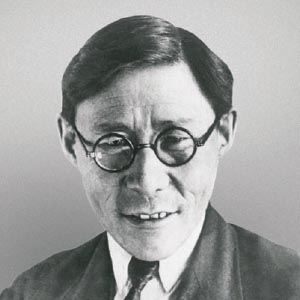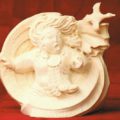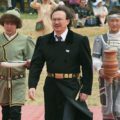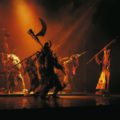The ancient epos of Olonkho is often called the Yakut Odyssey or the Norther Iliad. These heroic tales appeared more than 1,200 years ago and for a long time existed only in spoken form.
Olonkho refers to tales about ancient heroes, from 10 to 50 thousand verses long, as well as the storytelling tradition. Narrators, or olonkhosuts, were skilled storytellers and singers, for Olonkho consists of spoken and sung parts. They spent years perfecting their skills, travelling throughout Yakutia and reciting stories for future generations to remember. Olonkho is based on a single universe with intertwined and recurring storylines. Olonkhosuts used to perform their songs over several evenings, often improvising and mixing various plotlines. Some Olonkhos are said to take more than 10 days to recite.
Performance of the Yakut epic required quite some acting skills, because olonkhosuts had to recite them without accompaniment in different tones, using mimics and gestures to help the audience vividly imagine the described events.
The events take place in three worlds: the upper world ruled by Yakut gods; the middle world inhabited by people and ichi, or spirits; and the lower world populated by abaases, evil demons who devour human souls. The Aal Luuk Mas tree stands in the center, with its roots in the lower world, its trunk in the middle, and its branches reaching towards the gods of the upper world.
The Olonkho songs tell stories about heroes, descendants of the gods banished from the upper world who fight the abaases to protect their family and tribe. Heroes and their sisters-in-arms are depicted very positively: they are strong, kind and noble. The ugly-looking demons of the lower world, on the other hand, represent everything evil — greed, malice, vengefulness, and lust.
Olonkho is a very ancient epos that originated before the Turkic and Mongolian peoples migrated to Yakutia. These songs can tell a lot about the history, philosophy, moral values of the Yakut people.

The Aiy tribe, like the ancestors of the Yakuts, learned to cultivate the land, ranch cattle and survive in harsh climate and tribal wars. Before the advent of the written language, olonkho served educational purposes, transferring knowledge and the specifics of everyday life of the people to new generations. It reflects the rich language and the ancient mythological thinking of the Yakuts, their patriarchal tribal way of life. The first olonkho songs were recorded only in the 1840s. The largest legend, “Nurgun Bootur the Swift”, was recorded in the 1920-30s by Platon Oyunsky, who also was an olonkhosut.
In April 2022, the Sakha republic celebrated its 100th anniversary the Yakut Autonomous Soviet Socialist Republic, currently the Republic of Sakha (Yakutia). The genre continues to evolve: olonkhosuts master their skills, perform at national festivals, traditional art contests, as well as in theaters and on the radio. The Olonkho Theatre, founded by Yakutia State Councillor Andrei Borisov, has been operating in Yakutsk for 14 years. Thanks to his efforts the Olonkho tradition took a new form of development — stage. On November 25, 2005, UNESCO included the Olonkho epic in the Intangible Cultural Heritage List, and this day was proclaimed the Olonkho Day.
Marina Zhukova





